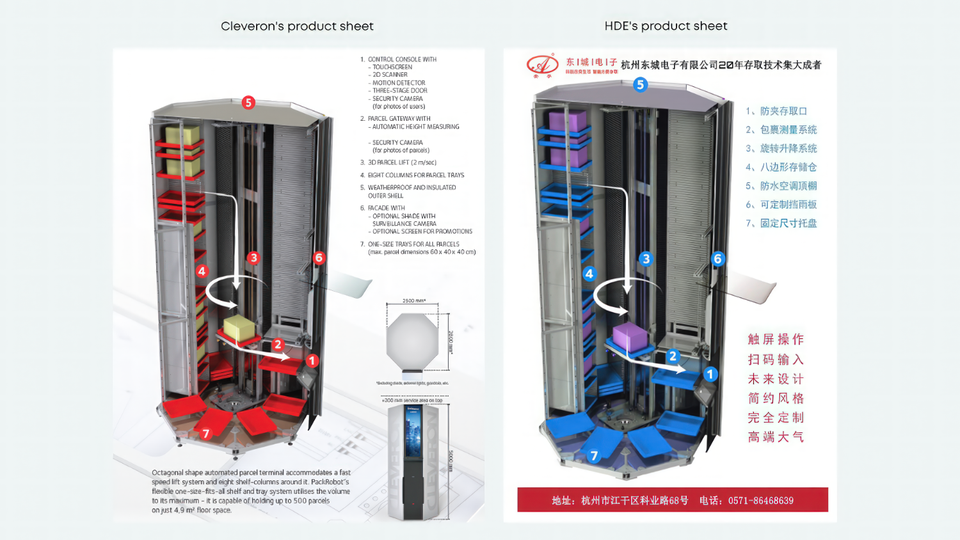Hardware
Estonian terminal/robot manufacturer wins patent case against Chinese firm
Cleveron AS successfully challenged China's intellectual property administration in a Chinese court. The victory was achieved more than four years after filing an application for invalidation.

January 26, 2023
Cleveron AS, an Estonia base manufacturer of parcel terminals and robots which has been active in the U.S. market, won an intellectual property dispute over its Cleveron 401 pickup tower following an extensive legal battle, according to a press release.
In 2017, Cleveron AS discovered that a Chinese company had registered an invention already invented by Cleveron. In 2018, Cleveron filed an application for invalidation of the patent with the China National Intellectual Property Administration. After the initial application was denied, Cleveron challenged the decision in the Beijing Intellectual Property Court.
The story began in 2015 at the Paris Post Expo where Cleveron presented its Cleveron 401, then known as PackRobot. A Chinese company, Hangzhou Dongcheng Electronic Co. Ltd., took an interest in the robotic parcel terminals but did not purchase any.
Rival registration filed
In 2017, Cleveron discovered that the Chinese company had successfully registered in China an invention that had previously been created and published by Cleveron after Cleveron had filed for industrial property rights in Europe and the U.S. and had acquired a worldwide copyright. HDE's Chinese registration limited Cleveron's ability to sell patented products on the Chinese market.
Cleveron in 2018 filed an application for invalidation of patent No. 201620761322.2 for the HDE device.
 |
Siim Timpson |
"Although Cleveron's products can be found in 51 countries around the world, our solutions are not sold in China and commercially it is not a very important market for us," Cleveron CEO Arti Kütt said in the press release. "However, we wanted to protect our patent to avoid confusion in the future if we were to expand our footprint to China."
Evidence deemed insufficient
In December 2018 the Patent Reexamination Board denied Cleveron's application and maintained the HDE patent, finding that the evidence provided by Cleveron was insufficient to prove the lack of novelty.
The most surprising aspect of the board's decision for Cleveron was that YouTube demonstration videos by Cleveron prior to HDE's patent application were not considered evidence in determining novelty on the grounds that YouTube was not a reliable place of publication, as the board had doubts as to whether the date of publication on YouTube could be changed.
Another fact not in Cleveron's favor was that the Cleveron patent applications, although filed earlier than the HDE patent application, were only published after the publication of the HDE patent, and could therefore not be used to prove lack of novelty of the HDE invention.
Cleveron challenges board's decision
Cleveron was not satisfied with the board's decision and decided to challenge it in the Beijing Intellectual Property Court.
In December 2020, Cleveron received the news that the court had annulled the board's decision and required it to adopt a new decision.
Among other things, the court found that YouTube videos are reliable and can be used as evidence in China.
The final victory was achieved in the second half of 2022, more than four years after the request for invalidation, when the Patent Reexamination Board satisfied Cleveron's application for invalidation and HDE's patent was fully cancelled, according to the press release.
"This case taught us to be extremely careful when dealing with Chinese companies," Siim Timpson, intellectual property and patent specialist at Cleveron, said in the press release. "We should consider registering intellectual property in China as soon as possible, since it is much cheaper than dealing with the aftermath. As patent systems vary greatly and offer much faster publication/registration options for one party, it is quite logical to assume that the number of Chinese patents will continue to grow at a high rate."
Images provided by Cleveron AS.
 ChatGPT
ChatGPT Grok
Grok Perplexity
Perplexity Claude
Claude










